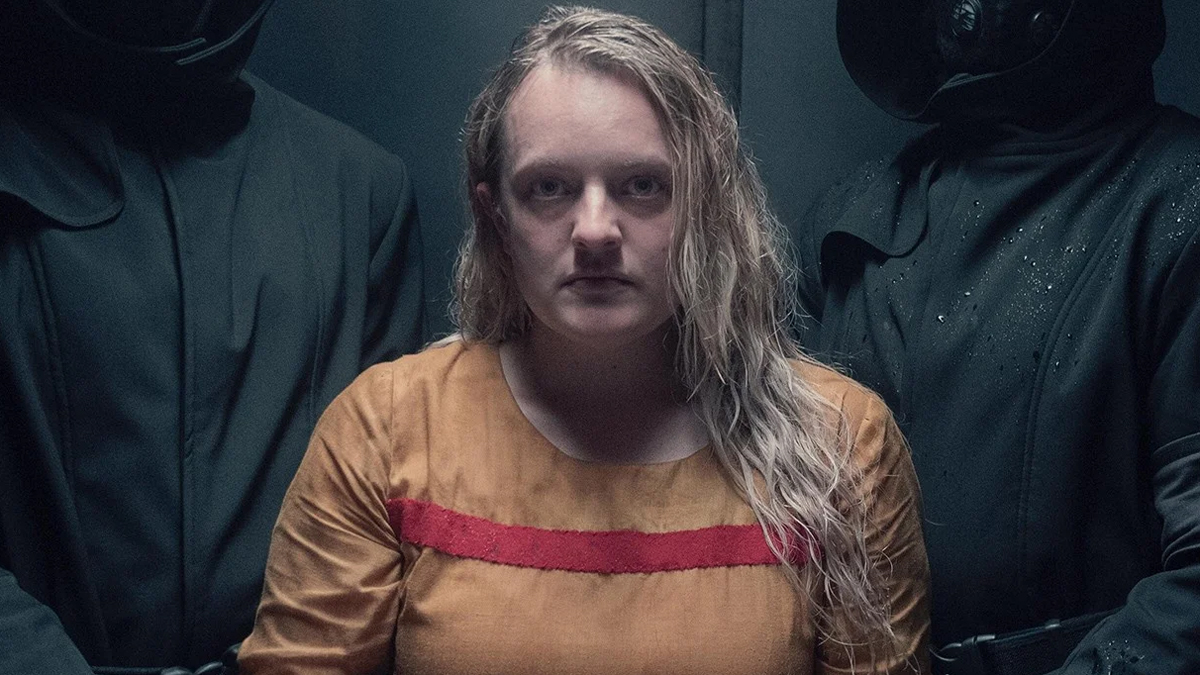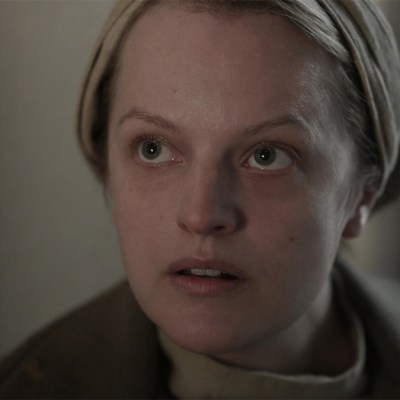This The Handmaid’s Tale review contains spoilers.
If you’re going to direct your first TV episode, why not do it like that. Elisabeth Moss – whose 30-year acting career has given her ample time to figure out what and what not to do behind the camera – did not go small in her debut.
‘The Crossing’ stood apart from the normal run of things by using almost no existing locations or sets. Largely set in a monumental prison facility where June was subjected to a series of brutal interrogation methods, it was horror through and through. With strobing red lighting, a doom-infused score, claustrophobically tight close-ups and discomfiting high angles, it used every atmospheric trick in the book to conjure up a sense of panic. Job done. Although June’s so armoured in plot by this point that we know she’ll survive anything, it’s hard to remember a more dread-filled hour. In this show, that’s an achievement.
The imagery it created was neither timid nor forgettable. Hannah in the glass cage, the surrealist dream sight of Commander Lawrence at the dinner table, Beth and Sienna on the rooftop, June in the containment box, her beaten body being hosed down in the cell… The Handmaid’s Tale came out of the gates with such a strong visual identity that after four seasons, it’s hard to stamp new images on viewers’ minds. ‘The Crossing’ – a title that evokes both the train track escape attempt and June’s (understandable) betrayal of her fellow Handmaids – left us with several.
It helped that the torture was bracketed by two-handers between some of this show’s most valuable players, with dialogue from showrunner Bruce Miller that got to the heart of character and theme. Against the hallucinatory setting of that lavish candlelit meal, Commander Lawrence summed up the regime with the line “Gilead doesn’t care about children. Gilead cares about power.” The piety, the godliness, the rituals… it’s all hypocritical window dressing, a means to an end.
Not though, for Aunt Lydia, who until now, hasn’t just drunk Gilead’s Kool-Aid but bathed in the stuff. It’s worth asking just how strong Aunt Lydia’s belief is at this point. She’s brutal, obviously, but not without caring instincts. The momentary pause as she cross-stitched her way through June’s waterboarding screams hinted at a character struggling with Gilead’s more barbarous tactics. Compare her full wheel of emotions in this episode to the two-dimensional evil of June’s smiling gee-whiz torturer and it’s possible to believe Lydia’s foundations could be weakening. She already admitted to having had reservations about Gilead’s Magdalene Colony innovation.
Read more
Put Elisabeth Moss and Ann Dowd as June and Aunt Lydia in scenes together and the result will always be worth watching. Give each character the means to destroy the other in those scenes, and that goes double. The way June rounded on Lydia when she realised what a nerve she’d struck by accusing her of failing her “precious girls” was a thrill. Watching Lydia turn the same accusation against June later on was neatly done. Those two have developed into distorted reflections of the other – both leaders devoted to a cause, both fulsome in their conviction, both with blood on their hands. June’s latest escape attempt didn’t come without a cost.
Thanks to the use of Radiohead’s ‘Street Spirit’, the escape scene was so emotionally dialled up that it felt like a finale – which it obviously was for Alma and Brianna. As the Handmaids ran towards that track, you first had to wonder if they weren’t aiming at the other side, but, Thelma and Louise-style, running towards the release of death that June had begged for earlier. No, this was another escape, one that reduced their number from six to two. Of the original Red Centre group, only June and Janine remain alive in Gilead. The flashback to the group’s early sisterhood (using the opening lines of Margaret Atwood’s original novel in voiceover) was a tribute to those characters, who’ve been here since the start.
How far a shackled June and Janine will get on foot in the time it takes for that train to pass remains to be seen. They’re certainly going to need help.
Could Nick provide it? His character’s is-he-isn’t-he ambivalence remains a frustrating rather than tantalising tease. Until Nick told Commander Lawrence in that cosy fireside drinks session that he wasn’t able to move on from June, we still didn’t know where he stood. Was he manipulating June just to get her to talk? Seeing their romantic goodbye on the bridge so soon after watching Nick deliver June to her torture chamber, even if he was trying to keep her alive, felt overly simplistic. Perhaps they were just doing like the song said – immersing themselves in love.
‘The Crossing’ was this season’s most memorable instalment so far, and hopefully marks a turning point after which the story will stop spinning in circles and really start to motor. This has to be June’s final escape, the first step of her path out of Gilead. To quote Aunt Lydia, it’s the start of a new adventure.
The Handmaid’s Tale season four episodes one to three are available to stream now on Hulu in the US. Season four will air on Channel 4 at a later date.
The Handmaid’s Tale season four episodes one to three are available to stream now on Hulu in the US. Season four will air on Channel 4 at a later date.


